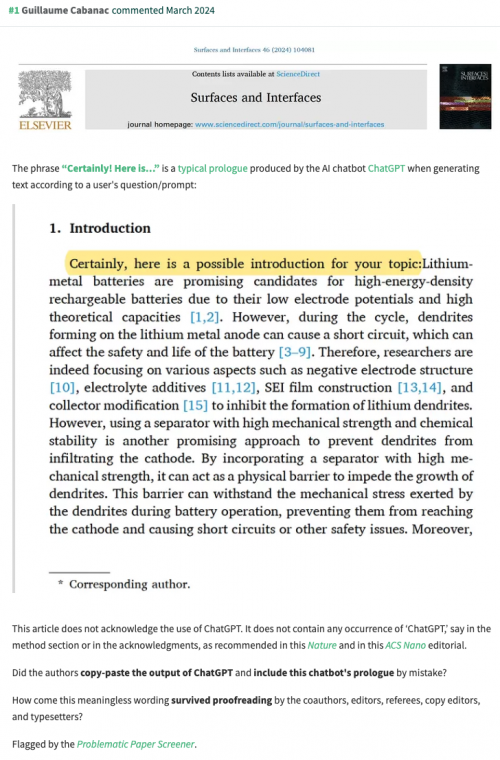Here’s a blatant example of AI polluting the scientific literature:
I, too, would like to know “How come this meaningless wording survived proofreading by the coauthors, editors, referees, copy editors, and typesetters?”
OK, typesetters are forgiven, it’s their job to print exactly what they are given, but the others? No sympathy. I think the answer is that there is so much trash poured out on their desks that their eyes glaze over and they end up rubber-stamping everything, because the alternative is madness. They’d have to read this junk.



There is also that line “Therefore, researchers are indeed focusing on…” I call that sort of padding “studentese” because I used to see it so frequently in student essays on topics they had only a superficial grasp of and were trying to sound like their idea of academic flourishes. It’s hard to describe, but easy to spot. Perhaps the most well known example might be that poor beauty pageant finalist who stage-frightened herself into gushing a word salad of “thus and such like” all over the set. It’s actually kind of interesting to me that AI bots have learned to mimic this sort of padding without specifically being taught to do it.
“Slurgle burgle sex-trafficking cartels at the border because of Biden”. Someone used an AI to write a speech.
There’s almost no such thing as a proofreader, copy-editor, or typesetter any more, because those people cost money, and machines can do the work (poorly) for free. I used to do all those jobs, and it’s dispiriting to see just how bad published writing has gotten. Even The New York Times and Harper’s Magazine, once exemplars of rigorous copy-editing, have become sloppy and dotted with errors, not just occasionally but frequently and inevitably — errors that any human would have caught.
Ridana @ 1
The example you provide is obvious padding but it may be hard to define. Good style requires rewrites and a bit of creativity that AIs lack.
We still have typesetters?
Off topic, but I remember watching a Twilight Zone episode years ago in which Burgess Meredith played an evil typesetter.
Let’s face it: Elsevier may once have been legitimate, but now it’s just a predatory publisher.
@5 christoph — Yes, there are still typesetters. I’m one.
Technical stuff especially — mathematical, chemical, or any other symbolically rich text — still requires at least a modicum of nuance and I’ve yet to work with any author who seems willing to risk their hard work to an algorithm to maintain their reputation in the published world.
No surprise to find a lot of creationists (including Dumb Idiot Ham and his AiG clowns) using AI for their diseased crap. There must be a lot of them using AI all over the net and beyond.
@ John Harshman
I was going to answer PZ’s question with one word:
ELSEVIER
Mind you I don’t have a lot of trust in Wiley either.
And that’s before start on the bottom feeders.
Dorothy Bishop of / BishopBlog has an interesting discussion of some papers from MDPI publishers.
Other than papers by people I am familiar with(*) (I’m old enough and high enough in my field to know most of the better researchers) I am really reluctant to accept papers for review. The whole thing is a waste of time – either the topic is trivial or it’s been plagiarised, and on lucky occasions it’s BOTH! I still accept on the off chance that there is something of interest in the scrawlings … I’m still rewarded some times.
Oh I forgot – sometimes the authors don’t have a clue about what they are writing about and it’s pitiful to read.
When I do complain, most of the time the paper is soundly rejected – even those times when I think the paper could be salvageable if it were completely redone. However, these are all very reputable journals, helmed by conscientious editors.
As for the garbage generative programs – if you’re going for niche topics, the source material they use is the crap that gets by (or bypassed by) the better editors and reviewers. So, the crap spun out of the word salad tossers is naive and WRONG.
(* And in some cases, the person writing the paper seems to have slapped that person on the authors list without permission.)
“Word salad tossers” — that sounds like a perfect alternative name for
generativeregurgitative AI. Thanks for that.In the big team programming world we pass code through a series of quality reviews.
The reviewers have checklists to run through. The really good reviewers go beyond that and they interrogate the coder about why they went down a path and could they make this more readable etc. The best also fully understand the code and what it is trying to achieve.
However, there is an opposing force: time, cost, deadline.
The best environment is where the good reviews are firewalled from that force but the reviewers have an internal compass as to what is excessive.
Forgot to say, I sometimes get AI to help with reviewing. It doesn’t do the review for me, but points out things might want to look at.